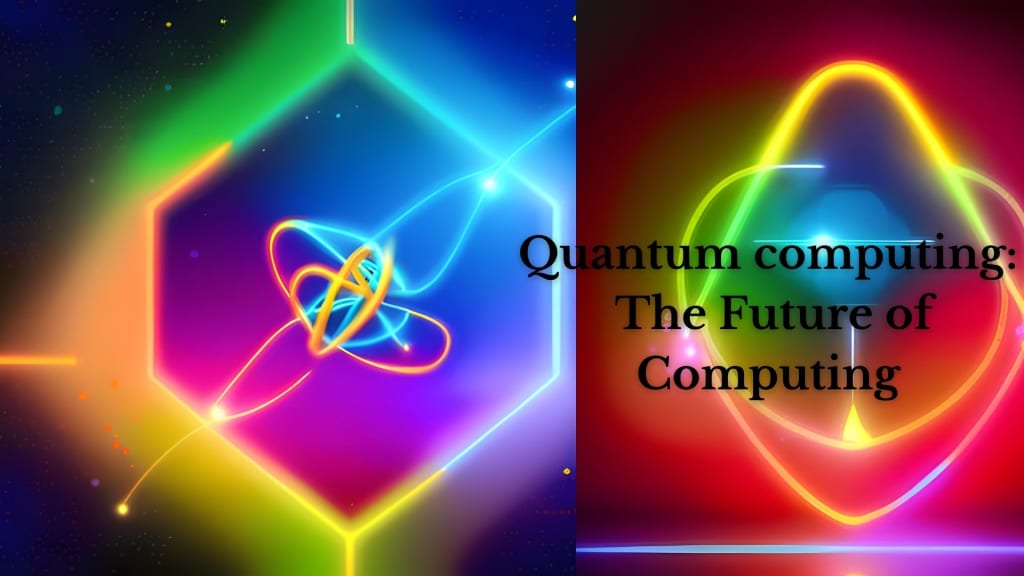Title: Quantum Computing
The Future of Computing

Quantum computing is a revolutionary technology that has the potential to transform the way we solve complex problems. Unlike classical computers, which use bits that can only be in one of two states (0 or 1), quantum computers use quantum bits (qubits) that can be in multiple states at the same time. This allows quantum computers to perform certain calculations much faster than classical computers.
One of the most promising applications of quantum computing is in cryptography. Cryptography is the science of encoding and decoding information so that it can only be read by authorized parties. Many of the encryption methods that are used to secure our data today, such as RSA and elliptic curve cryptography, are based on mathematical problems that are difficult to solve using classical computers. However, quantum computers can break many of these encryption methods using an algorithm called Shor's algorithm. Shor's algorithm can factor large numbers much faster than classical computers, which is the foundation of many encryption methods. This means that if quantum computers become powerful enough, they could potentially break many of the encryption methods that are used to secure our data today.
However, quantum computers can also be used to develop new encryption methods that are resistant to quantum attacks, such as quantum key distribution. Quantum key distribution is a method of encryption that relies on the principles of quantum mechanics to generate and distribute secret keys. Unlike classical key distribution methods, which are vulnerable to eavesdropping, quantum key distribution is secure against all types of attacks.
Another potential application of quantum computing is in optimization. Many real-world problems, such as scheduling and logistics, require finding the optimal solution among a large number of possibilities. Classical computers can only solve these problems by trying every possible solution, which can be very time-consuming for large problem sizes. Quantum computers, on the other hand, can use quantum algorithms such as Grover's algorithm and quantum annealing to find the optimal solution much faster.
Grover's algorithm is a quantum algorithm that can search an unsorted database of N items in O(sqrt(N)) time, which is much faster than the O(N) time required by classical algorithms. This can be used for a variety of applications, such as searching for a particular item in a large database or finding the shortest path in a graph. Quantum annealing is a more specialized type of quantum computing that is designed for optimization problems. Quantum annealing uses a physical process to find the lowest energy state of a quantum system, which can be used to solve optimization problems.
Finally, quantum computing has the potential to revolutionize fields such as materials science and drug discovery. Many problems in materials science and drug discovery require simulating the behavior of molecules and materials. Classical computers can only simulate these systems to a certain degree of accuracy, which can limit the effectiveness of simulations. Quantum computers, on the other hand, can simulate the behavior of molecules and materials much more accurately than classical computers. This can help researchers develop new materials and drugs faster and more efficiently.
Despite these promising applications, quantum computing is still in its early stages. Quantum computers are currently very expensive to build and maintain, and they require specialized expertise to operate. However, many companies and research institutions are investing in quantum computing, and there is a growing ecosystem of quantum software and hardware providers.
One of the biggest challenges in quantum computing is the issue of quantum decoherence. Quantum decoherence occurs when a quantum system interacts with its environment, causing the quantum state to collapse and lose its quantum properties. This can limit the usefulness of quantum computers, as they require a stable quantum state to perform calculations. Many techniques have been developed to mitigate the effects of decoherence, such as quantum error correction and fault-tolerant quantum computing.
Another challenge in quantum computing is the issue of scalability. Quantum computers currently have a limited number of qubits, which restricts the size and complexity of problems that can be solved. However, many companies and research institutions are working on developing larger and more powerful quantum computers.
In conclusion, quantum computing is a promising technology that has the potential to transform many fields. While it is still in its early stages, it is worth keeping an eye on as it evolves and matures. The development of new quantum algorithms, the improvement of quantum hardware, and the mitigation of quantum decoherence and scalability issues will be key to unlocking the full potential of quantum computing.
About the Creator
GelStories
I am Melfred and I am passionate, and I like reading and writing. In this page I am going to write many stories covering many interesting subjects such as lifestyle, business, investments, school, science, cuisine, culture, etc. Welcome!






Comments
There are no comments for this story
Be the first to respond and start the conversation.